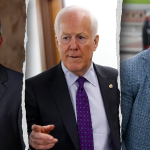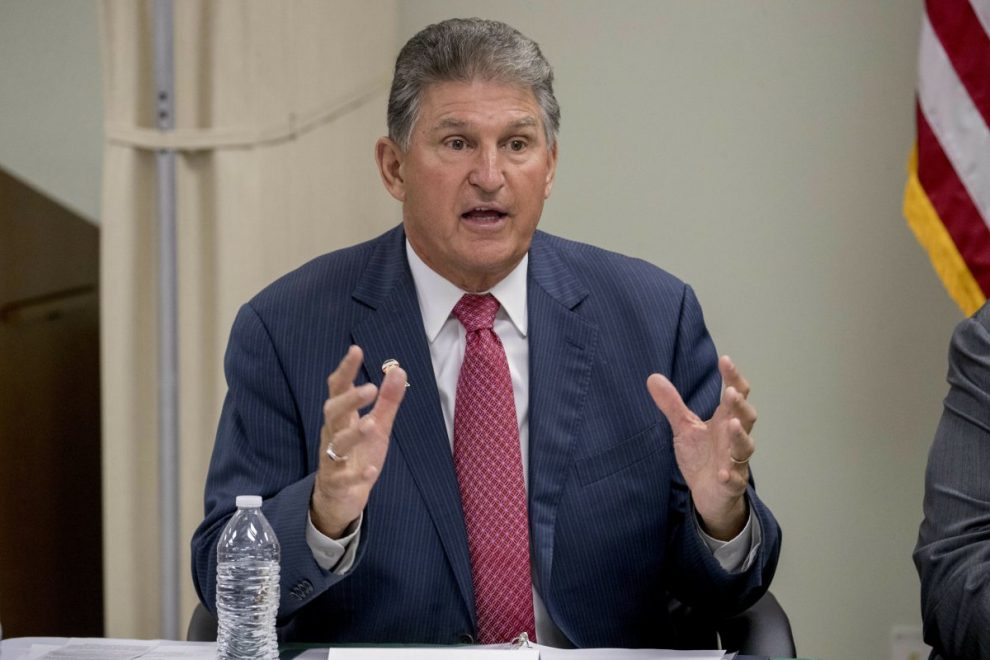Among Americans who aren’t liberal pundits, the debt and deficit rank as major concerns. It’s about time Congress noticed.
Sen. Joe Manchin (D–W.Va.) didn’t play in Wednesday’s annual congressional baseball game, but he managed to throw the best curveball of the evening anyway.
In a lengthy statement, Manchin spelled out the reasons he is unwilling to support the $3.5 trillion reconciliation package his fellow Democrats are hoping to push through Congress within the next few days or weeks. “Spending trillions more on new and expanded government programs,” he said, “when we can’t even pay for the essential social programs, like Social Security and Medicare, is the definition of fiscal insanity.” Manchin went on to say that he worries about how more government spending might drive inflation even higher, how higher taxes necessary to pay for that spending will make it harder for small businesses to compete with big retailers like Amazon, and how an expanded welfare state might slow the ongoing economic recovery.
Manchin’s opinion about these things carries a lot of weight right now. Democrats have the slimmest possible majority in the U.S. Senate, and need all 50 of their members (plus Vice President Kamala Harris) to vote in support of the reconciliation bill or it will not pass. The senator from West Virginia has all the leverage, and he’s using it to force the rest of Congress to take a good, hard look the fiscal mess its made over the past few years (and, more specifically, since the COVID-19 pandemic began.
“I can’t support $3.5 trillion more in spending when we have already spent $5.4 trillion since last March,” Manchin said. “I cannot—and will not—support trillions in spending or an all or nothing approach that ignores the brutal fiscal reality our nation faces.”
While he did not specifically invoke the $28 trillion national debt or the federal government’s current budget deficit, Manchin obviously wants to draw Congress’ attention to the massive disconnect between how much the government spends and how much it collects in taxes. According to the Congressional Budget Office (CBO), the national debt will exceed the size of the U.S. economy by the end of this year and will continue growing as annual budget deficits pile up over the next few decades. “A growing debt burden could increase the risk of a fiscal crisis and higher inflation as well as undermine confidence in the U.S. dollar, making it more costly to finance public and private activity in international markets,” the CBO has warned.
Higher levels of debt mean higher interest costs and larger sums of money that must be dedicated to debt service. Every dollar spent paying for the cost of carrying so much debt is a dollar that can’t be used on something else. If interest rates rise even just a few percentage points, the cost of servicing $28 trillion (and counting) of debt will skyrocket.
As Manchin also pointed out, the government is already going to need a lot of dollars to fix the trajectories of the major entitlement programs—Social Security will be insolvent in the early 2030s and part of Medicare will be unable to fully pay benefits in just five years.
But while the senator at the center of the reconciliation bill drama has made clear he won’t support $3.5 trillion in new spending, he’s been more than a bit vague about what sort of package would earn his vote. There are a few nuggets to be mined from Manchin’s statement on that front: He signals support for undoing some of the Trump tax cuts and for means-testing expanded social programs to ensure they are aimed at the truly needy. Those seem like places where Democrats might find a compromise that satisfies both Manchin and the party’s progressive wing.
Relatedly, Politico reported Thursday that Manchin offered in July to support a $1.5 trillion reconciliation bill. That plan would reportedly raise corporate income taxes, personal income taxes on high earners, and the capital gains tax. Excess revenue beyond the $1.5 trillion necessary to pay for the bill would reportedly be directed to deficit reduction.
Manchin is hardly the only person worried about these things, though you wouldn’t know it by paying attention to Congress or the national media. An April poll conducted by the Pew Research Center found that 72 percent of Americans rated the federal budget deficit as a “very big” or “moderately big” problem for the country. It ranked ahead of violent crime, racism, the pandemic, illegal immigration, and lots of other issues that get far more attention.
Manchin’s Wednesday statement drew condemnation from some public figures on the political left who have decided that there’s nothing wrong with massive deficits and nothing to fear in piling up more debt.
THERE IS NO BRUTAL FISCAL REALITY THE NATION FACES; IT IS ENTIRELY MADE UP!
— Chris Hayes (@chrislhayes) September 29, 2021
I’d go further and argue not only is debt not bad, it’s actually in current circumstances *affirmatively good.* As the world’s reserve currency, have a moral obligation to do what we can to help power a global economic recovery from Covid and lead the way on climate investment.
— Chris Hayes (@chrislhayes) September 29, 2021
In truth, no one is sure how much money the federal government will be able to borrow before a crisis hits—piling up debt is like walking down an infinite hallway with an invisible pit, as Noah Smith has described it. But higher levels of debt are associated with lower economic growth even in places that haven’t suffered major meltdowns. The surely catastrophic consequences of America going through a major debt crisis demands that even a small risk of one must be taken seriously. And there is no arguing with the fact that we are now in uncharted territory.
“America is a great nation but great nations throughout history have been weakened by careless spending and bad policies,” Manchin said Wednesday. “Now, more than ever, we must work together to avoid these fatal mistakes.”
Republicans and Democrats have mostly abandoned any interest in fiscal responsibility. But Manchin has decided, for whatever reason, that deficits actually do matter. And, right now, he’s got the power to make the rest of Congress listen.
Story cited here.
























